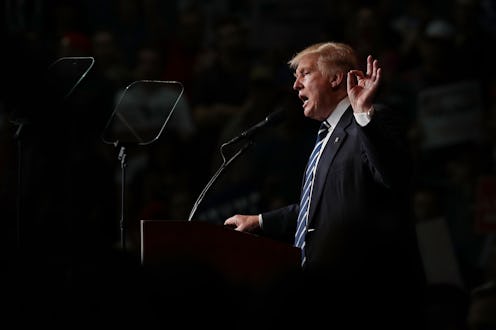Life
This Characteristic Of Trump Voters Is No Surprise
If you've wondered how Donald Trump's supporters can continue to brush off his disrespectful behavior toward women, people of color, and anyone who isn't directly related to the Republican presidential nominee, researchers may have shed light on the answer. According to Vox, political scientists at the University of Michigan have found that sexism is a predictor of supporting Trump, which... isn't all that surprising. To fling Trump's words right back at him: Sad!
Even before the release of the infamous tape from 2005 in which Trump (on a hot mic) described kissing and groping women without their consent, he made clear how little he respects women — especially his political opponent, Hillary Clinton. What's more, Trump rallies tend to reflect these attitudes. In May, the Huffington Post called the anti-Clinton paraphernalia sported by some supporters "cruel and disgraceful," and while many Republicans abandoned ship after the hot mic fiasco, many other supporters remained largely unmoved.
The misogyny characterizing the Trump campaign from the beginning is what led three researchers — Carly Wayne, Nicholas Valentino, and Marzia Oceno — to look into the attitudes toward gender and women among the Republican nominee's supporters. In June, long before the hot mic tapes came to light, they surveyed 700 U.S. citizens; along with characteristics like political ideology and party identification, they measured sexism and gender attitudes using a well-known scale. According to their results, which the researchers explained in the Washington Post on October 23, sexism was a strong predictor of supporting Trump. In other words, the higher someone rated on the sexism scale, the more likely they were to support Trump and less likely to support Clinton.
Much has been said about Trump's racist rhetoric, and his supporters are often characterized as similarly xenophobic — white conservatives afraid of shifting demographics in the United States. But as the political scientists point out, this downplays the role of sexism in the success of Trump's campaign. In fact, according to their research, sexism predicted Trump support just as strongly as ethnocentrism (aka racism), and more than an authoritarian political ideology.
Here's where things get interesting. Sexism can often be divided into two types, benevolent and hostile. Both see women as inferior to men, but the difference lies in the reaction to the perceived inferiority. Benevolent sexism is old-school; this attitude holds that women are delicate and deserve protection. Hostile sexism, on the other hand, reflects antagonism toward women — the kind of sexism researchers measured in the survey discussed above. It's also apparent in any of the presidential debates, whether you're watching Trump interrupt Clinton 51 times or call her a "nasty woman."
In their Washington Post column, the team of political scientists also described research from earlier this year. In the experiment, they found that anger exacerbated sexism's role in supporting Trump, while fear actually diminished it. Furthermore, as Vox reports, the same three researchers conducted another survey in August, this time focusing on benevolent sexism. The results were very different. "The hostile sexism is highly correlated, but the benevolent sexism really is not," Wayne told Vox.
The conclusion? It's anger towards women, not the traditional "family values" glorified by many Republican politicians, that appears to motivate some voters to support Trump. I don't know which is scarier: That Trump has gotten this close to the White House despite his hostility toward women, or that it appears to have struck a chord among voters.
Images: Giphy (2)
